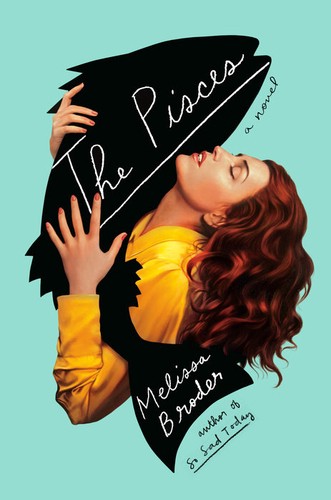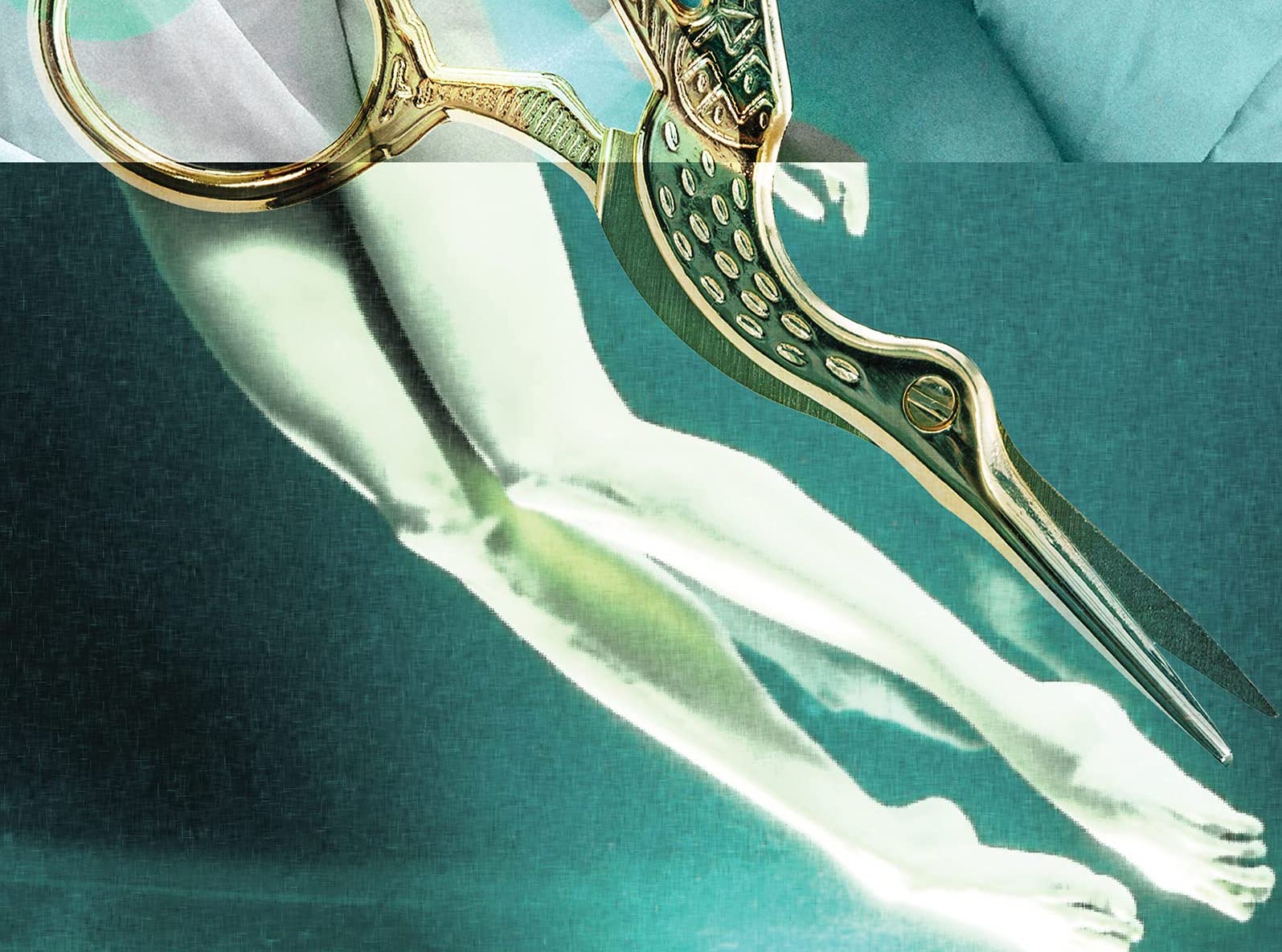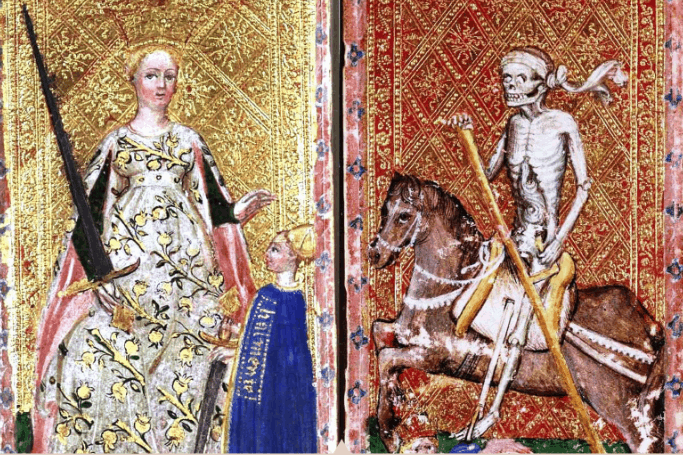interviews
Always Pee After Sex with a Merman
Melissa Broder, author of ‘The Pisces,’ on realistic sex scenes, existential anxiety, and which mythical creature she’d bang

Several years ago, writer Chelsea Hodson introduced me to Melissa Broder’s poetry. I picked up Meat Heart, and fell in love with the collection’s apocalyptic charisma: “There appears a hinge in every young woman’s life / when ponies fly out of her soul, her tongue catches fire, / a wet corsage falls from the ceiling. Your ponytail / will not protect you.” I devoured Meat Heart and When You Say One Thing But Mean Your Mother, then pre-ordered Scarecrone, then waited for more.
In 2015, Broder revealed herself as the voice behind @SoSadToday, a darkly comic Twitter account hyped by Katy Perry and Miley Cyrus, now boasting over 650,000 followers. @SoSadToday gained popularity through its narrator’s frank yet funny tweets about depression and desire, like “love in the time of anxiety disorder”, “*whispers during sex* i hate having a body”, “fuck me in the middle of a cookie sandwich”, or (a personal favorite) “feel like satan would have sex with me and then message me 5 months later like ‘hey’ and talk about music.” After Broder’s unmasking, a poignant personal essay collection of the same name followed in 2016.

This year, Broder brings us her debut novel, The Pisces, in which an academic, Lucy, becomes enamored of a merman, Theo, on the shores of Venice Beach. The novel deals in romance, obsession, group therapy, and the complications of mer-sex.
“The difference between love and _______ is makebelieve,” Broder wrote in her 2014 poem, “Shiny Eyes.” Love, makebelieve, and blankness permeate The Pisces as well. Between Lucy’s existential anxieties and her lover’s literal tail, The Pisces is charged with mythologies both personal and universal.
Melissa Broder and I talked over the phone about physical dissolution, capitalist magic, and sex with mythical creatures, our conversation occasionally punctuated by her dog, Pickle, barking at his canine enemy down the street.

Deirdre Coyle: You’ve said that you were never a big mermaid fan. What are your favorite mythological creatures? Are there any you find more fuckable than mermen?
Melissa Broder: Not to fuck, but I love a Pegasus. Not to have sex with, just to be my companion. In terms of fucking, I would say my top is Apollo because he’s a twink, and he reminds me of a wild skater boy of the sun. We’d hook up once and then I’d never hear from him again, which is very hot.
I feel like Circe from the Odyssey. One time, I hooked up with a woman and we had the exact same boobs, and it really freaked me out. Circe turns Odysseus’ men to swine, but then she feels guilty and turns them back. And that’s something I could totally see myself doing. So I feel like Circe and I would hook up, and then we’d realize we’re very similar, and then we’d just become friends.
‘Circe’ Shows Us How Storytelling Is Power—And How That Power Can Be Seized
I think the Kraken, that giant squid? I’ve always had a thing for Ursula the Sea Witch; she’s so hot. You know that painting, The Dream of the Fisherman’s Wife? It’s hot. I mean, come on, you gotta get with the giant squid.
So I’d say those three, and maybe, if I was feeling frisky, Cerberus, the hound of hell. I just read this book called The Bridegroom Was a Dog by Yoko Tawada; it’s a New Directions book. The woman has sex with a dog, but you’re never really sure if this character is fully a dog, or just has dog attributes, you know? It’s a dog personified. And I feel that way about Cerberus; it’s not like really fucking a dog. It’s a hybrid, something with dog attributes.
I’d probably be more inclined to have sex with all of those guys before I’d have sex with a merman. But Theo is pretty hot. I’d fuck Theo.
I mean, come on, you gotta get with the giant squid.
DC: In Celtic mythology, the mermaids of are supposed to be really beautiful, while the mermen are described as being grotesque and monstrous. They’re really ugly and that may be why the mermaids prefer to hook up with sailors. That obviously doesn’t apply to Theo, because he’s hot, but I was wondering if there were any particular merpeople mythologies that you drew from while writing him?
MB: No, because I needed to create Theo the way I needed to create Theo. First of all, I needed him to be a character who would turn me on, so I could write hot sex scenes. So I built him how I wanted him to be built, and I’m sure there are mer-fundamentalists who are gonna be like, “No.” But, you know, that’s what the imagination is for. I mean, I knew some things about mer-lore and mer-mythology, but not so much about mermen, actually. I always joke, when people ask how similar I am to Lucy, I’m like, “Well, I’ve never fucked a merman, so.” But I’ve also said there are mermen on Tinder. And certainly the gross mermen you’re describing are. Recently, I keep getting hit on in the supermarket by these dudes who are the same dude over and over again. And I get really angry and mean. Not just that they’re trying to talk to me, but also because I’m like, why can’t you just be young and attractive? Then maybe I would tolerate you in stereo for a minute. I’m mad that the people who are hitting on me are the ugly mermen, and not the hot mermen.
I’m mad that the people who are hitting on me are the ugly mermen, and not the hot mermen.
DC: If you’re gonna get hit on by a rando in the supermarket, they could at least be hot.
MB: Yeah, like if a merman’s gonna hit on you in the granola bar aisle? Come on, man. So I find myself being really mean, which is interesting because in the book, Lucy has a really hard time saying “no” when she’s in sexual situations that she doesn’t like. She appears to be giving consent, right? But inside, she’s like, “Ugh.” But she doesn’t understand why she doesn’t say “no.” And I’ve felt that way too sometimes, with not only sexual situations, but also just interactions with people in the world. So it can feel really liberating to not give a fuck, and to be like, “Get away from me.”
DC: I love it. I think women are socialized to make people comfortable, and that makes it hard to yell at creeps, even when they’re objectively being creepy.
MB: Yeah. But then sometimes you’ve had enough and something takes over within you.
DC: And that’s great. Even on Lucy’s first Tinder date, she goes out with a creepy guy, and she goes home with him, but doesn’t want to have sex with him. It’s a really funny scene even though it’s also describing a very creepy reality, where she feels like she can’t leave. She watches him masturbate, and that’s her way of getting out of the situation. But she’s still having this internal monologue about wanting to leave.
MB: I’m actually writing a piece about this right now, exploring what it is within us that — when there’s no threat of violence — that doesn’t say, “Wait, stop. I don’t want to be doing this.” For myself, it’s almost like sometimes I don’t value my own reality. It’s like, “Well, let’s just finish this up and we’ll be done.” It seems easier. Instead of being like, “Stop. I’m out of here.”
DC: Not creating conflict.
MB: Yeah.
DC: Lucy gets a U.T.I. after a bad date, because she doesn’t pee after sex. It’s terrible for the character, but I love that you wrote about that. I couldn’t think of any other novel where a character gets a U.T.I., or even a yeast infection, but it’s such a common experience.
MB: Yeah, that definitely happens after not a “good” sex scene. But even with the “good” sex scenes, I’m committed to a sort of “pleasure realism,” I like to call it. Sometimes I’ll be reading erotica, or literary erotica, and the woman comes on page 121. And I’m like, I wouldn’t have come ’til page 138. Whether you’re having sex with a merman, or you’re having sex with a human, sometimes it takes a long time to have an orgasm. You should always pee after sex. And sometimes, the U.T.I. in my own life has been more profound than the sexual experience, and a more lasting memory. So I find that those details are important to include.
DC: Physical dissolution has a lot of appeal in the book, which is also something you’ve written about in your poetry, and on Twitter. There’s a scene where Lucy says, “I certainly understood the prison of the body…[I] tried to sustain that gift I had given, which was to disappear in the nothingness and thus no longer have to be aware of it.” I think that describes something difficult to put into words but extremely relatable. Do you ever find creative work to allow that sense of physical dissolution?
MB: Sometimes when you’re in the flow of writing, you do get to vanish into it. And, you know, it’s the quest for a higher power, the desire to escape oneself. I feel like it’s all the same. It’s just a question of what we make our higher power, you know? ’Cause I’ve made so many things my higher power, and Lucy obviously makes sex and love her higher power. And the problem with that is that it works really well but it’s not sustainable, because we’re reliant on something outside ourselves to get out of ourselves, when in truth, there’s also that place deep within ourselves where we can escape having a body. And it’s probably the same place that we find outside of ourselves, but it’s not contingent on anything ephemeral, or any other person, place, or thing we have to buy or ingest or consume to get there. But it seems so much easier to go outside ourselves for it, because all that shit’s right there — and who wants to go within? For myself, like Lucy, my greatest fear is disappearing, or dissolving. And my greatest wish is disappearing or dissolving. It’s like Lucy says, there are two kinds of vanishing.
For myself, like Lucy, my greatest fear is disappearing, or dissolving. And my greatest wish is disappearing or dissolving.
DC: In that vein, I also really liked the scenes about “capitalist magic” as a way to search outside yourself for that vanishing. Personally, I’m super into the idea that buying something will make me spiritually whole. And I like that that showed up at the beginning of the book, when Lucy first moves to Venice and finds the New Age store. And she kind of replaces crystals with sex and love.
MB: Yeah. And it’s all the same, right? It’s all the same. It is such a delicious thought, like, oh if I just purchase this thing, then I will be rendered whole. But then you take it home and it just becomes more crap after a while, and you just need another crystal. Not to say that I don’t love crystals, and I think they’re things of beauty, and they probably can be harnessed. But I think that when we look to anything outside ourselves to be the thing — there is no the thing. There are things. And perhaps there’s a daily recipe of different things to keep us afloat.
Venice is such a ripe place for capitalist magic. It is perhaps the epicenter. You go into the boutiques, you go into the crystal shops, and it’s like, oh, the answer is all here. I just have to buy this candle that is said to bring financial stability…for 40 dollars. So there’s a little bit of judgment about it in the book, but a lot of it’s just compassion for that human instinct. And it’s funny! It’s so human.
DC: What made you decide to set the book in Venice?
MB: Well, I lived there for four years. I was working from home, and I was three blocks from the beach, so it was almost like, I couldn’t not set the book in Venice. I was steeped in Venice. I’m actually working on another book right now and that’s set in Venice, too. Venice is such a character. I mean, I didn’t want to move to L.A. [from New York], but then I moved to Venice and really loved it. Being from the East Coast, maybe for the whole time I was living [in Venice], I was very aware of where I was living. Even living in New York, after a couple of years, I forgot I was living in New York. It’s just home, it’s just your stuff. But in Venice, I remained aware of how special it is, how unique it is, how totally nuts it is, for so many reasons.
Lucy obviously makes sex and love her higher power. And the problem with that is that it works really well but it’s not sustainable, because we’re reliant on something outside ourselves to get out of ourselves.
DC: Lucy’s relationships with women in The Pisces have a redemptive quality that provides a really nice foil to the toxic relationships that she’s having with men, especially in the beginning of the book. I was revisiting your collection, Scarecrone, after reading The Pisces, and there’s a line in the poem “Mythic” that reads, “I brought my holes and all the men / flew up inside. / What got left behind are women / who will save me.” I think Lucy’s relationship with Claire — and I don’t want to get into spoiler territory here — was a particularly interesting foil to Lucy’s romantic relationships.
MB: Yeah. I mean it’s funny because a lot of people have said, “Oh, Claire is horrific!” I’m like, Claire is the funnest friend you could ever have. I would be friends with Claire in four seconds. But I do believe in the power of women to save each other’s lives. I’ve experienced it many times over, and sometimes it can even be strangers. Sometimes — like in Lucy’s case, in group therapy — you can get the message that will save your life from someone you cannot stand. You just never know where the message is going to come from, and you only have to hear one thing. And sometimes you can be completely resistant to the messenger, and be repulsed by the messenger, perhaps because the messenger — like the women in group therapy — reflects things about you, your own vulnerabilities, and you’re like, “Ew! How can this person be putting their vulnerabilities out there?” Because you have not gotten to a comfortable place where you can put your own vulnerabilities out there, like Lucy. She’s just like, “Ugh, disgusting! So weak and unappealing.” And that’s not to say that all the characters in the group are likeable. But just because the messenger doesn’t look or seem like who we think they should look or seem like, or just because we don’t agree with everything they say, doesn’t mean they might not have one message for us that’s of profound value. And I think Lucy comes to realize that.
DC: So I kind of wanted to end on a goth note.
MB: Nice.
DC: In one scene, Theo describes Lucy as “gloomy yet charming,” and “gently death-ish.” And I felt like that could also describe your internet presence, especially with @SoSadToday, and it’s something that resonates with a lot of people. How do you find that balance in your work, between being gloomy and charming?
MB: Well, I think the ability to charm about gloom and depression is definitely a privilege. Because there have been times in my life where the window shade goes all the way up, and it’s like my eyeball is pressed against death, and there isn’t any space, or there doesn’t feel like there’s any space to charm about it. So when the blind goes down just a little, and you can get a little distance, I feel this way about writing, and it’s why I love to write and why I love humor; I love control, and there are certain things like death that I’m never gonna have control over, but that illusion of control is very sweet. And writing has given me the ability to live in that illusion of control, and that may be an illusion. But it’s also given me the ability to reframe narrative of the past, which is not so much an illusion. You get to reconstruct narrative, and you get to find out what you know. I don’t really know how I do it, and how I maintain the balance, but I can tell you why I do it. That is because I have a great fear of the unknown, and a great fear of life and death equally. Writing gives me the illusion of being moored.









